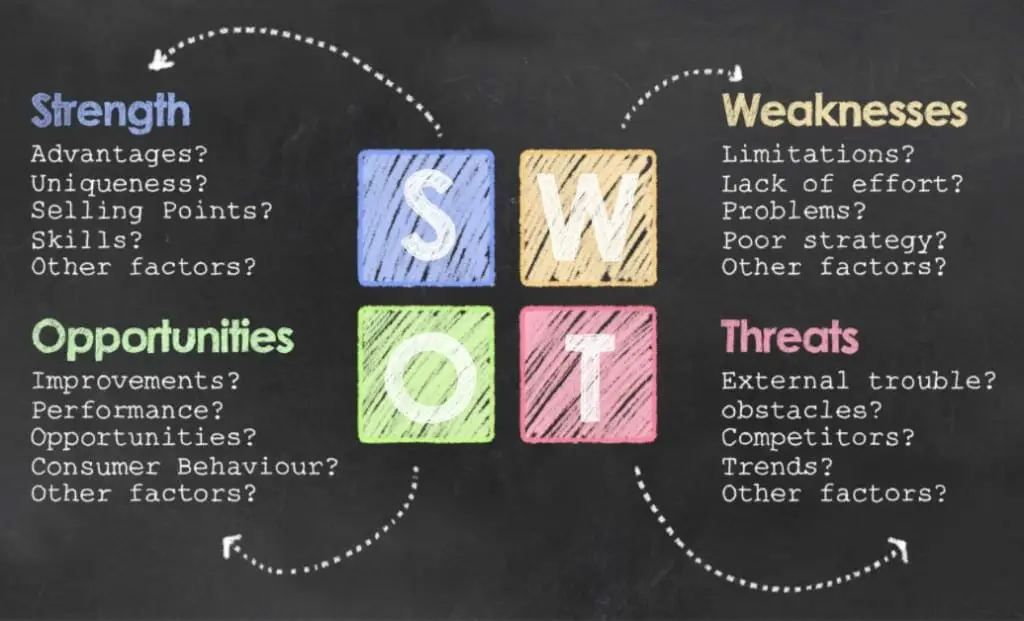Ten Things You Want to Know about Your Competition
As an online business owner, it is important to understand the competition to remain competitive and successful. Knowing who your competitors are and what strategies they use can help you make better decisions about how to best position yourself in the marketplace.
Understanding your competitors can also help you identify opportunities that may not be available to other businesses and maximize your potential growth. So, what do you need to know about your competitors to succeed? Here are ten things you want to know about your competition:
DISCLOSURE: Some of the links that I share in this article ARE my affiliate links. This means I may earn a commission, at no extra cost to you. In fact, sometimes you'll get a discount or free credits just FOR using my link. 🙂
Who are your competitors?

First, know who the major competitors are before finding out more information about them. There are two types of competitors, namely direct and indirect competitors. Identifying direct and indirect competitors is an essential part of understanding the competitive landscape in any industry.
Direct competitors are those businesses who offer similar services or products to yours, while indirect competitors are businesses that offer either complementary or substitute services or products.
For example, McDonald's and Burger King would be direct competitors since both of them sell hamburgers, and Pizza Hut would be McDonald's indirect competitor since it's selling a different type of product but still targeting the same group of customers.
What products or services do they offer?
Once your competitors are identified, the second of the ten things you want to know about your competition is what services or products they offer. Knowing what types of products and services they provide can help you determine how to differentiate yourself from them and make your business stand out.
For example, if all the competitors only offer basic web design services, you could offer more specialized or advanced web design services to differentiate yourself.
What is their pricing strategy?
Pricing is an important factor for competing with your competitors online since it has a major impact on the customer’s decision-making process. Knowing what strategies they used to set prices, as well as how they compare to each other, can help determine the most effective way to price your products or services.
For example, if one competitor is offering their services for a lower price than yours, try either to match their price or provide more value so that the customers still choose your business over the competitor's.
What is their online presence like?
Analyzing your competitors’ online presence to get an idea of how effective their digital marketing efforts are. Start by evaluating their website design and customer experience.
You can use tools such as Google Analytics or SEMRush to track and analyze their website traffic, social media engagement, and search engine rankings.
You can also review their content to see which topics they’re focusing on and what type of content they’re creating. This can give you insight into the topics that are resonating with their customers and allow you to create content that appeals to the same audience.
By looking at your competitors’ online presence, you can gain an understanding of where they have a presence and which channels are most effective for them. This will help you decide where to focus your own efforts and which channels are worth investing in.
How are they marketing themselves?
Marketing is a key component of success in any industry, so it’s important to understand what tactics your competitors are using to reach their target customers. Analyzing their marketing materials and campaigns will help develop an effective strategy that will set you apart from them.
You can start by identifying any sales or promotions they are currently running. Sign up for their newsletters from their website to receive information on their sales and promotions. Note which platforms they are using to reach their target customers and how they are using them.

Knowing which platforms they are using and how they’re using them can help you determine how to best position yourself in the marketplace to effectively compete with them.
For example, if your competitors are active on social media, but you’re not, then that could be a great opportunity for you to jump in and engage with potential customers. You can also take advantage of any weaknesses they may have their channels or campaigns and use them to improve your own efforts.
Understanding your competitors' marketing strategies can thus help you determine what type of tactics they’re using and how to change them to suit your own needs. It could also give you insight into new campaigns that may be worth exploring.
What are their target market and customer demographics?
Knowing your competitor's target market and customer demographics can help you better understand their business strategies. This information can inform your own marketing efforts so that you can reach the right customers in the right way.
Use it to identify potential areas where your business could gain an edge. You may also discover areas where they are not focusing and a potential gap that can be filled.
For example, if the competitors are primarily targeting young adults aged 18–25 with their products, then tailor your marketing strategy to be more appealing to that same demographic, or you may identify whether there’s an untapped market of older customers to reach out to.
You can also use this information to determine who your competitors are actually competing with and what type of competition you may have in the future.
How well are they serving their target markets?
Customer reviews and feedback are an invaluable resource, as they can provide valuable insight into customer satisfaction with the products and services of their competitors.
By analyzing customer reviews, you can determine what issues customers have with their competitors’ offerings and how they can improve upon them. Find customer reviews from your competitors' websites, social media pages, marketplaces such as Amazon or Etsy or even review sites.
For example, if you notice customers are complaining about the lack of customer service at one of your competitors, use this feedback as an opportunity to differentiate yourself by providing better customer service.
By leveraging customer reviews, you can discover areas where your competitors may struggle and come up with ways to improve upon their offerings. Knowing what customers like and dislike about your competitors can also help to better position yourself in the market.
Another thing that would be useful to find out is how they handle customer complaints. Do they respond quickly and effectively, or do customers feel like their complaints are being ignored? Knowing how your competitors handle customer complaints can give you a better idea of what level of service you should strive to provide.
What are their strengths and weaknesses?

By evaluating their strengths in areas such as marketing, customer service, and product development, you can determine how they’re succeeding in the marketplace and what strategies they are using to stand out from their competition.
One way that many companies stand out from their competition is by offering unique and innovative products or services. Many businesses will develop a product or service that isn't available anywhere else, allowing them to tap into new markets and gain an edge on their competitors.
Businesses can also differentiate themselves with unique branding and marketing strategies. For example, some companies have created viral campaigns that help them stand out from their competition.
You can also identify areas where they may have fallen behind or where you might gain an edge. Weaknesses can include anything from a lack of customer service to outdated or ineffective marketing strategies.
Identifying these weaknesses can give insight into areas where your business could gain an edge and differentiate itself from the competition.
For example, if competitors are active on social media but weak in content marketing, then focus more of your energy on creating great content to differentiate yourself.
What are their growth and expansion plans?
It’s important to understand if they are planning to expand into new markets, products, or services. Knowing their growth plans can also help determine if they’re entering a market that you could tap into but haven’t yet done so.
For example, if your competitors are ramping up their efforts in a new market, then consider doing the same to stay competitive.
It’s also important to research what types of investments they are making and where they are spending money. Understanding their investments can help you make more informed decisions about where to invest your own resources.
When researching the competition, try to identify any potential threats that may arise based on their plans. For example, if your competitors are launching innovative services, this could be a threat to your business, as it could take away market share or make them more competitive.
You should also note whether they are using any innovative technologies or tools that could affect your business. Understanding your competition’s growth plans can give a better understanding of their strategies and help you stay ahead of them.
How are they different from you?
Understanding what sets you apart from your competitors is key to staying competitive and is the last of the ten things you want to know about your competition. When researching the competition, take note of any unique features or services that they provide and how they differ from yours.
Also, what advantages do they have over you? Do they have better technology, more resources, or a larger market? Understanding what sets your competitors apart from you can help you understand why they may be more successful in certain areas and allow you to adjust your own strategies accordingly.
Finally, don’t forget to consider the intangible things that set them apart. Are their customers loyal because of the unique customer service they provide or the relationships they build with their customers? How do they maintain the relationship with their customers?
Understanding these human elements can help differentiate your business from theirs and create a competitive advantage.
Conclusion on ten things you want to know about your competition
I hope this article has provided some insight into how to get to know your competition and understand their strategies. As an online entrepreneur, it’s important to stay informed and take advantage of any opportunities that present themselves.
By taking the time to research your competition, you can gain a better understanding of their strategies and how they’re performing in the marketplace, allowing you to learn from your competitors and make informed decisions about your own business.
Knowing all this information about your competition will give you the insights and knowledge needed to take your business to the next level. Use what you learn to stay one step ahead and create a unique strategy that will help you stand out from the crowd.









